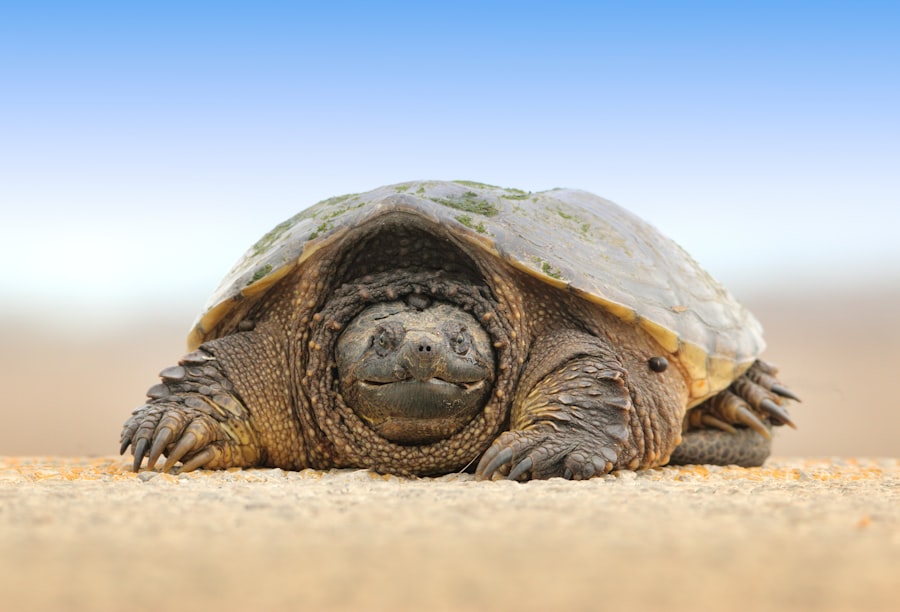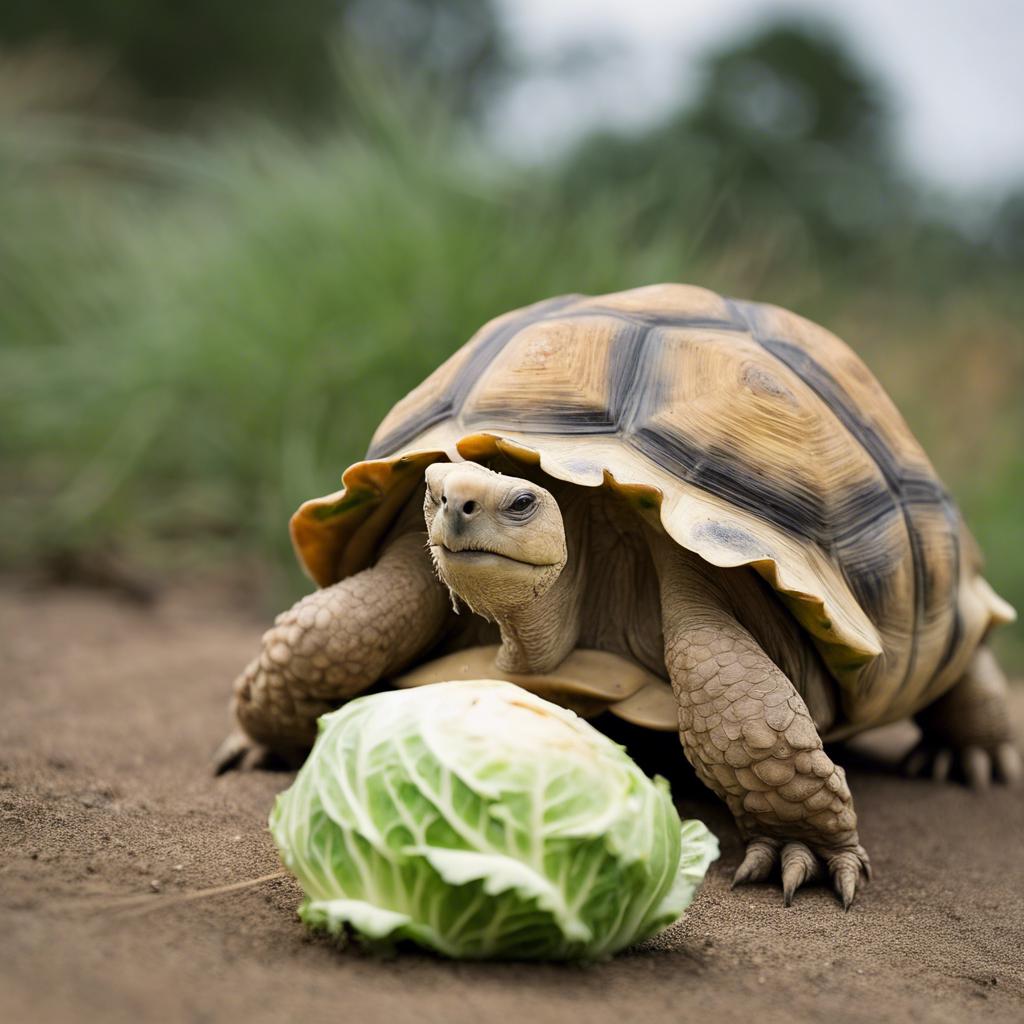Sulcata tortoises, also known as African spurred tortoises, are one of the largest species of tortoises in the world. They are native to the Sahara Desert and have adapted to survive in arid environments. As herbivores, their diet primarily consists of grasses, weeds, and other plant material. However, it is important for owners to understand the specific nutritional needs of Sulcata tortoises in order to provide them with a balanced diet.
Key Takeaways
- Cabbage can be a safe and nutritious addition to a Sulcata tortoise's diet.
- Feeding cabbage to Sulcata tortoises can provide benefits such as improved digestion and hydration.
- Overfeeding cabbage to Sulcata tortoises can lead to health risks such as diarrhea and nutrient imbalances.
- Cabbage should be prepared properly and fed in moderation to Sulcata tortoises.
- Other vegetables that Sulcata tortoises can eat include kale, collard greens, and dandelion greens.
Nutritional Value of Cabbage: Is it Safe for Sulcata Tortoises?
Cabbage is a leafy green vegetable that is rich in vitamins and minerals. It is low in calories and high in fiber, making it a healthy choice for humans. However, when it comes to feeding cabbage to Sulcata tortoises, there are some considerations to keep in mind.
Cabbage contains a compound called goitrogen, which can interfere with the production of thyroid hormones in animals. In large amounts, goitrogens can lead to thyroid problems and goiter formation. While cabbage does contain goitrogens, the levels are relatively low compared to other cruciferous vegetables like kale or broccoli.
Benefits of Feeding Cabbage to Sulcata Tortoises
Despite the potential risks associated with goitrogens, cabbage can still provide some benefits for Sulcata tortoises when fed in moderation. Cabbage is a good source of vitamin K, which is important for blood clotting and bone health. It also contains vitamin C, which is an antioxidant that helps boost the immune system.
In addition, cabbage is high in fiber, which can help promote healthy digestion in Sulcata tortoises. The fiber content can also help prevent constipation and other digestive issues that these tortoises may be prone to.
Risks of Overfeeding Cabbage to Sulcata Tortoises
While cabbage can provide some nutritional benefits, it is important to be cautious about overfeeding it to Sulcata tortoises. As mentioned earlier, cabbage contains goitrogens, which can interfere with thyroid function in large amounts. This can lead to thyroid problems and goiter formation.
In addition, cabbage is also high in water content, which can cause diarrhea if fed in excess. Diarrhea can lead to dehydration and other health issues in Sulcata tortoises. It is important to monitor the amount of cabbage being fed and ensure that it is not the sole component of their diet.
How to Prepare Cabbage for Sulcata Tortoises
When feeding cabbage to Sulcata tortoises, it is important to properly prepare it to ensure that it is safe for consumption. First, remove the outer leaves of the cabbage and wash it thoroughly to remove any dirt or pesticides. Then, chop the cabbage into small, bite-sized pieces that are easy for the tortoise to eat.
It is also recommended to blanch the cabbage before feeding it to the tortoise. Blanching involves briefly boiling the cabbage in water and then immediately transferring it to an ice bath to stop the cooking process. This helps soften the cabbage and makes it easier for the tortoise to digest.
Other Vegetables That Sulcata Tortoises Can Eat

While cabbage can be included in a Sulcata tortoise's diet, it should not be the only vegetable they consume. It is important to provide a variety of vegetables to ensure a balanced diet. Some other vegetables that are safe for Sulcata tortoises include:
– Romaine lettuce
– Collard greens
– Mustard greens
– Turnip greens
– Kale
– Bell peppers
– Squash
– Carrots
It is important to note that vegetables should be fed in moderation and should not make up the majority of a Sulcata tortoise's diet. Grasses and weeds should still be the primary component of their diet.
How Much Cabbage Should You Feed Your Sulcata Tortoise?
When it comes to feeding cabbage to Sulcata tortoises, moderation is key. It is recommended to feed cabbage as an occasional treat rather than a staple food. A good rule of thumb is to feed cabbage no more than once or twice a week, and in small amounts.
The amount of cabbage to feed will depend on the size and age of the tortoise. Younger tortoises may only need a few small pieces, while larger adults can be given slightly larger portions. It is important to monitor the tortoise's weight and overall health to ensure that they are not being overfed.
Signs of Overfeeding or Underfeeding Your Sulcata Tortoise
It is important to be aware of the signs of overfeeding or underfeeding your Sulcata tortoise. Overfeeding can lead to obesity and other health issues, while underfeeding can result in malnutrition and stunted growth.
Signs of overfeeding include weight gain, lethargy, and a lack of appetite. If you notice that your tortoise is gaining weight or seems uninterested in food, it may be a sign that they are being overfed.
On the other hand, signs of underfeeding include weight loss, shell deformities, and a lack of energy. If your tortoise appears thin or is not growing at a healthy rate, it may be a sign that they are not receiving enough food.
Tips for Maintaining a Balanced Diet for Sulcata Tortoises
To maintain a balanced diet for Sulcata tortoises, it is important to provide a variety of foods and monitor their intake. Here are some tips to help ensure a healthy diet for your tortoise:
1. Offer a variety of grasses and weeds: Grasses and weeds should make up the majority of a Sulcata tortoise's diet. Offer a variety of options such as Bermuda grass, dandelion greens, and clover.
2. Provide a mix of vegetables: In addition to cabbage, offer a variety of other vegetables to provide a range of nutrients. Rotate the vegetables to ensure a balanced diet.
3. Avoid high-sugar fruits: While fruits can be offered as an occasional treat, they should not be a regular part of the tortoise's diet. High-sugar fruits can lead to weight gain and other health issues.
4. Monitor portion sizes: Pay attention to the amount of food being offered and adjust portion sizes accordingly. Younger tortoises will require smaller portions, while larger adults may need more food.
5. Consult with a veterinarian: If you have any concerns about your Sulcata tortoise's diet or overall health, it is always best to consult with a veterinarian who specializes in reptiles.
Can Sulcata Tortoises Eat Cabbage? Yes, but in Moderation.
In conclusion, cabbage can be included in the diet of Sulcata tortoises, but it should be fed in moderation. While cabbage does contain goitrogens and can cause digestive issues if overfed, it can still provide some nutritional benefits when prepared properly.
It is important to remember that cabbage should not be the sole component of a Sulcata tortoise's diet. A variety of grasses, weeds, and other vegetables should also be provided to ensure a balanced diet.
By understanding the nutritional needs of Sulcata tortoises and monitoring their food intake, owners can help ensure that their tortoises remain healthy and thrive in captivity.
If you're interested in learning more about the dietary preferences of reptiles, you might also want to check out this informative article on whether can sulcata tortoises eat cabbage. It provides valuable insights into the nutritional needs of these fascinating creatures and offers guidance on incorporating cabbage into their diet. To read more, click here: Can Sulcata Tortoises Eat Cabbage.
FAQs
What is a sulcata tortoise?
A sulcata tortoise is a species of tortoise native to the Sahara Desert in Africa. They are also known as African spurred tortoises.
Can sulcata tortoises eat cabbage?
Yes, sulcata tortoises can eat cabbage. However, it should only be given to them in moderation as it is high in goitrogens which can interfere with their thyroid function if consumed in large amounts.
What other foods can sulcata tortoises eat?
Sulcata tortoises are herbivores and should be fed a diet that consists mainly of grasses, hay, and leafy greens such as kale, collard greens, and dandelion greens. They can also eat fruits and vegetables in moderation.
Can sulcata tortoises eat meat?
No, sulcata tortoises are strictly herbivores and should not be fed any type of meat or animal products.
How often should sulcata tortoises be fed?
Sulcata tortoises should be fed daily, but the amount and frequency of feeding will depend on their age and size. Younger tortoises will need to be fed more frequently than older ones.
What should be avoided when feeding sulcata tortoises?
Sulcata tortoises should not be fed foods that are high in protein, fat, or sugar. They should also not be given foods that are toxic to them, such as avocado, rhubarb, and chocolate.

